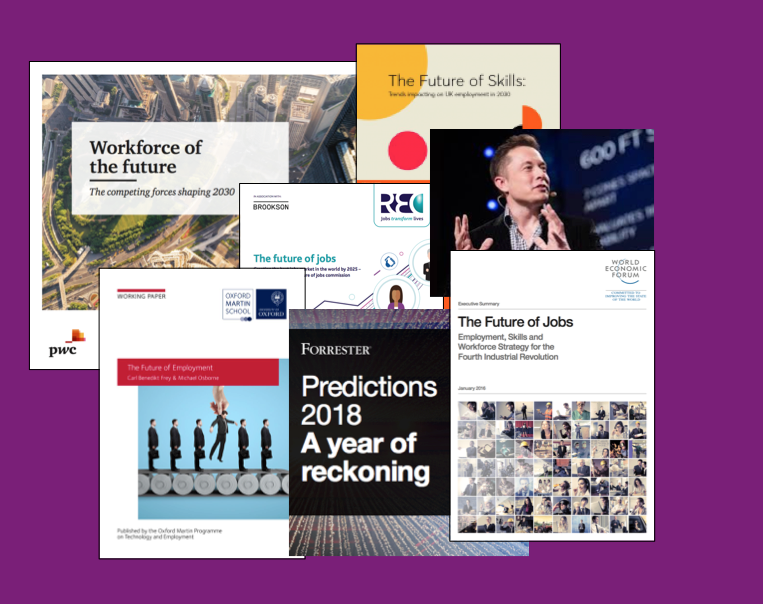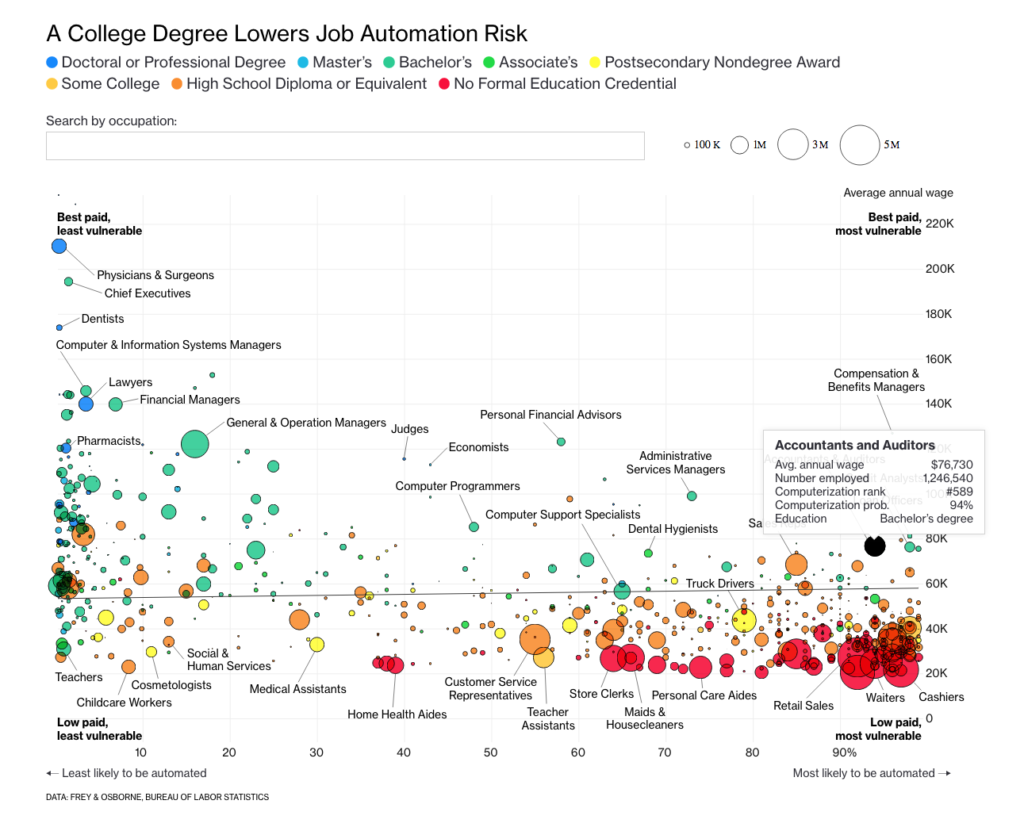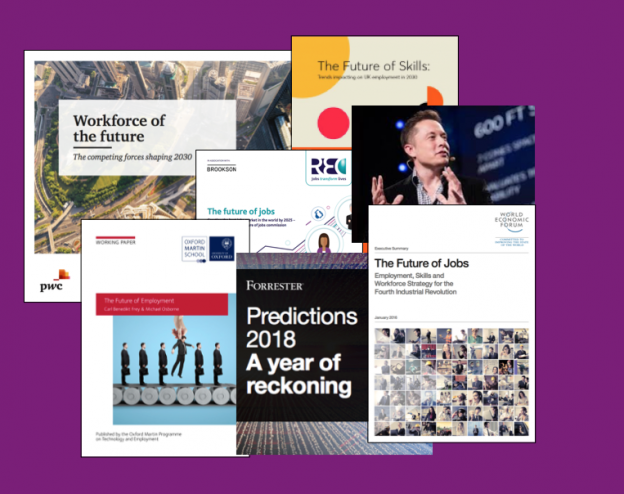In the next decade the fourth industrial revolution is going to totally transform the recruitment landscape.
According to PWC in its recent UK economic outlook, 7 million UK jobs will be displaced over the next 20 years however 7.2 million jobs will be created. Industries such as manufacturing and agriculture will suffer an overall jobs loss whilst other industries such as new tech and healthcare will see job growth.
So how do recruiters navigate this maelstrom of change?
This blog will hopefully start to unravel some of the complexities that surround this topic and provide you a toolset for you to understand how this will impact your recruitment business, niche and sector.
Future Workplace will see Job Fractionalisation
Jobs by their very definition consist of a number of tasks, which each employee undertakes on a daily and weekly basis. The effect of artificial intelligence (AI), augmentation and machine learning on the workplace will see technology increasingly displace humans in many tasks and processes, which will lead to the fractionalisation of work.
Recently Andy Haldane chief economist at the Bank of England said there will be widespread “hollowing-out” of job roles and whole job families as large swathes of people become “technologically unemployed.”
Other industry commentators, like PWC in their July 18 Economic Outlook (quoted above), are more neutral on the overall impact on the total number of jobs lost.
What is clear is that every job in every part of the economy is going to be impacted to a greater or lesser extent.
So how does this affect you as recruiters?
Taking the Pulse of the Market
Well for a start off it is going to dramatically change the nature of your job. Your markets are going to become even more dynamic than they have been. Sources of Talent are going to change, Talent itself will change, clients will seek new “Talent-Sets”and will be totally blind as to where to find these new “Talent-Sets”, what they will cost and how easy it is to find them or even what they look like.

This will create both opportunity and threats to you, your business and your income stream. You will need to become advisors to your clients and applicants, in other words “True-Consultants”
The skills gaps that exist in the UK economy today are going to shift, evolve, disappear, transform and all with increasing rapidity.
Most niche recruiters thrive on sourcing hard to fill skills for their clients. This model has enabled them over the past 15 to 20 years to secure premiums in their fees by being experts in how to source rare talent.
But when the talent itself is changing at such a dynamic rate how will you manage to sustain your placement rates?
How will you know where the talent is, where to find it and what it looks like unless you can successfully traverse this dynamically changing environment?
At Selling Success we see the key to the continued success of niche recruiters comes from learning to navigate this hugely dynamic landscape.
In essence you can become reactive or proactive as a recruiter. The large spoils however will undoubtedly belong to the proactive recruiters who learn to read this dynamic vortex. You will need to maintain your finger on the pulse of your market, constantly monitoring the shifts in “talent-sets”, hiring manager demands and candidate surpluses.
Future of Work Study Conclusions
In the past 12 months we as growth coaches at Selling Success have studied and spoken many times at conferences about the various Future of Work studies that have been conducted. A new one appears each week but here is a list of some of the major ones:

Having read and analysed many of these reports we have identified that there are number of commonalities of those jobs that will be automated and disappear.
Future of Work – Disappearing Careers
Typically these are jobs that are:
- Repetitive and routine
- Heavily knowledge-based
- High customer service/contact
- Highly administrative
- Possess a low number of predictable variables
- Low skilled
- Process orientated
You would need to spend some time studying your own sector to establish, which roles have the highest probability of disappearing. One tool that will help you comes from the work by Frey & Osborne from Oxford Martin University, which has been heavily quoted by many commentators. There is an interactive graphic produced by Bloomberg that enables readers and recruiters to enter a job type and see the likely risk of automation to the role.

Their graphic for example shows that Accountants and Auditor though well educated and well paid were at a 94% risk of their jobs being automated. Whilst this has been questioned by many readers, you only have to look at the accounting tools now available from Xero or Sage to understand how this can easily happen. As an example in the accounting and finance professions the jobs Frey & Osborne indicate will be lost are typically:
Future of Work – Resilient Careers
By contrast the ones that are least likely to be automated are ones that require:
- High degree of skill
- High levels of persuasion
- Man-management
- Emotional intelligence
- Emotional Care
- Are highly varied
- Critical Thinking
- Resolving Conflicting Concepts
- Original Thought
- Repair
You will need to analyse your own niche sector roles to establish which of your jobs that you recruit for regularly are the ones least likely to be affected.
In the world of healthcare however there are many jobs, which are likely to have longevity.
These would include the following:
- Dentists
- Surgeons
- Pharmacists
- Cosmetologists
- Medical assistants
- Theatre nurses
- Doctors and Locums

There is no doubt that automation will have an impact on all of these jobs and that several of the tasks that are performed by these individuals will be automated. Equally it is true to say however that the principle essence of these roles will continue in their current form for many years to come.
In addition to the jobs that exist in society today thousands of new jobs will be created in your niche sectors.
Future of Work – Emerging Careers
In principle these will be created around four main areas:
- Creating new technology
- Maintaining new technology
- Collaborating with new technology
- New Technological Dimension
The first three are self-explanatory and you should be able to track these during rigorous client and candidate meetings and interviews. Examples of these “emerging careers” would be:
Work Reimagined
The fourth one, “New Technological Dimension”, is less obvious.
As new technology become available it will create totally new services and solutions to problems and challenges that are currently beyond our comprehension. These jobs will only emerge once the new technologies have become established.
An example of this is “Vloggers”. Until the Internet and production technology enabled the easy creation and distribution of blogs and video, video-blogging was something that a 20th Century recruiter had no concept they would one day recruit.

The same is true of an “App-Developer” to a 1980 pre-mobile phone recruiter. Those of us recruiting in the 1980’s had no concept a job developing applications to run on mobile phones would ever be possible. The explosion of new technology that will come over the next 10-20 years with the fourth industrial revolution will see totally new careers, jobs and skills being created and demanded.
Again the only why to ride this wave of opportunity is to have your figure on the pulse of what is happening in your niche sector. Stay alert and learn to “reimagine work” as we know it.
Navigating the New Recruitment Paradigm

Armed with this information you are now in a position to start to make sense of how your niche and market sector will be affected in the coming decade. In fact by becoming a expert in identifying and predicting those roles that are most likely to be impacted you can start to transform your own skills and become a true consultant to your customers.
This should allow you to command premium rates from your clients for your services as well as develop and nurture mutually beneficial and profitable business relationships.
The time has arrived to become the true expert in talent sourcing in your niche, and may be it is also time to reimagine your own career.





